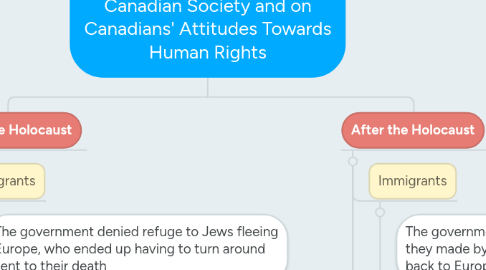
1. Before the Holocaust
1.1. Immigrants
1.1.1. The government denied refuge to Jews fleeing Europe, who ended up having to turn around sent to their death
1.1.1.1. Canada did not like non-white people and it was still a racist country
1.1.1.2. As of June 14th, 2016 27,580 Syrian refugees have arrived in Canada
1.1.1.2.1. Canada is now proud to be a diverse and multi-cultural country.
1.2. Aboriginals
1.2.1. the Indian Act that made it illegal for Aboriginal people to organize politically or to hire legal counsel to further land claims
1.2.1.1. Aboriginal people could not vote
1.2.1.1.1. Ipper Wash was a Native Reserve that was taken during WWII to build a training facility. After WWII it was turned into a park.
1.3. Women
1.3.1. In 1918, women got the right to vote
1.3.1.1. They were still a long way to go to be treated equally.
1.3.1.1.1. After the First World War, people finally saw that women could do more than just clean, cook and raise children because they had to work in factories.
2. After the Holocaust
2.1. Immigrants
2.1.1. The government realized the huge mistake they made by sending all the Jewish people back to Europe.
2.1.1.1. Canada now lets in more immigrants and refugees
2.2. Aboriginals
2.2.1. In 1951, Aboriginal peoples could finally pursue their legal and political interests in ways that had before only been available to non-Aboriginals
2.2.1.1. In 1960, all First Nations people were granted the right to vote.
2.2.1.1.1. In the 90s, Dudley George is killed by the police, Ipper Wash is returned and eventually a compensation is give.
2.3. Women
2.3.1. The government set up day care services for women who had to work.
2.3.1.1. Women got to join the military in WWII, C.W.A.C.S, C.W.A.A.F.S, W.R.R.N.
2.3.1.1.1. They were not given combat roles, but this was a big step. It is tough to deny rights to someone fighting for the country.

